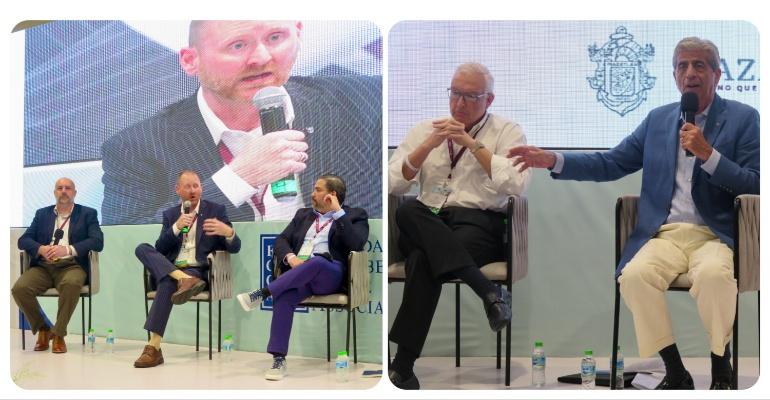These needs and others were on the lips of port operations executives on a Florida-Caribbean Cruise Association panel in Mazatlán.
'One size does not fit all of us,' said Juan Trescastro, VP global destinations, Virgin Voyages, who asked destinations to 'be creative and flexible.' He gave the example that if Virgin were taking people to the Eiffel Tower, it would invite them to a cool rooftop to sip Champagne and take in the vista.
Also, 'We believe in longer stays and overnights,' Trescastro said.

From left, Chris Martin, Bryan Attree, Carlos Estrada, moderator Alexander Gumbs, Juan Trescastro and Juan Kuryla
There are still attractive ports untouched by cruise ships that could add a lot to itineraries, according to Chris Martin, director, port operations, Holland America Line and Seabourn.
Consistent evolution
Bryan Attree, director, worldwide port operations, Royal Caribbean Group, talked about the need for consistent evolution, so people want to come back to destinations they've already visited.
His example: Perfect Day at CocoCay, the brand's top-rated destination worldwide, which continues to develop new offerings such as the upcoming Hideaway Beach for adults.
Oasis-class needs
And for destinations that aim to be Oasis-class capable, there is definitely a need. 'Currently we're limited' to many of the same itineraries, Attree said. Those who aspire to step up can learn from existing Oasis destinations.
But hosting an Oasis ship is a massive undertaking. So when a port tells Attree it plans berthing to handle four Oasis-class ships, he wonders if locals have figured in that they'll need buses for 28,000 cruisers.
'Understand time, speed and distance,' stressed Juan Kuryla, SVP port development & construction, Norwegian Cruise Line Holdings. 'Look at existing itineraries and how you can fit in.'
Lines aren't seeking seven beach destinations for a cruise. 'The cultural experience is very important,' Kuryla said.
Supporting decarbonization
And make sure sustainability is part of the equation, advised Rick Sasso, chairman of MSC Cruises USA. The pressure to decarbonize is critical and ports play a role.
The single best way to cut carbon emissions now is by saving fuel, so ships need to slow down, Sasso said, and that impacts itineraries.
While he didn't specify the fuel-saving angle, when it comes to Carnival Cruise Line's new Celebration Key, 'a lot' of Fun Ships will be going there, said Carlos Estrada, director of commercial homeport operations. (Already more than 500 itineraries have been announced, a breathtaking ramp-up for a brand-new destination.)
The panelists said shore power — only when it's supplied by clean energy — is desirable. But they recognize not all Caribbean destinations have the capacity to support the electrical needs of big ships.
Estrada noted Carnival will soon be hooking up at PortMiami.
Government incentives
Moderator Alexander Gumbs, CEO Port St. Maarten, said a shift to electric vehicles in port operations lies ahead. The US, for example, provides funding grants to help its ports in that transition.
Governments should offer incentives for EVs, Kuryla concurred, and when it comes to cruise-related port operations, he envisions changes like electric forklifts to load provisions.
Martin said Holland America and Seabourn aim for more local sourcing, in part because it gets trucks off the road. Also, if destinations can provide recycling and waste-to-energy alternatives, that would be a great advance.
Copyright © 2024. All rights reserved. Seatrade, a trading name of Informa Markets (UK) Limited.
Add Seatrade Cruise News to your Google News feed.  |

